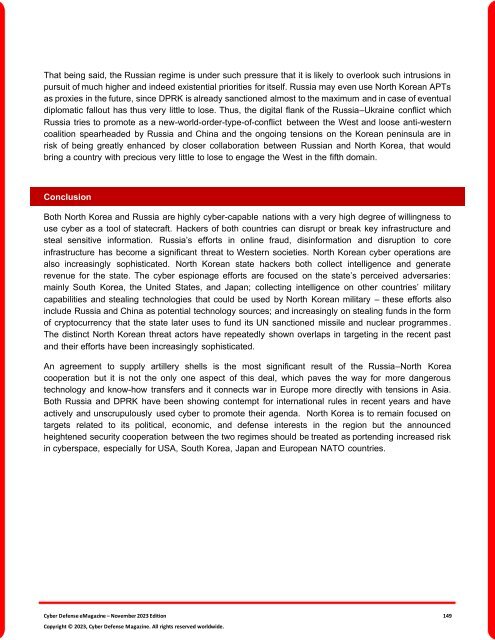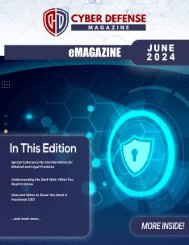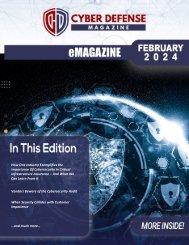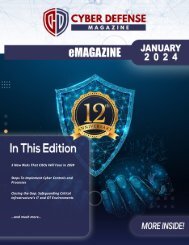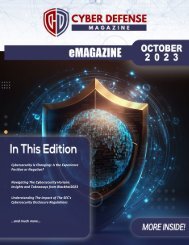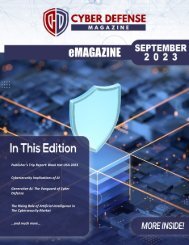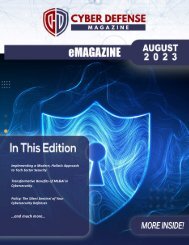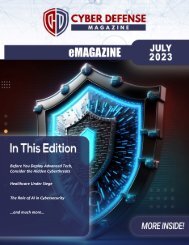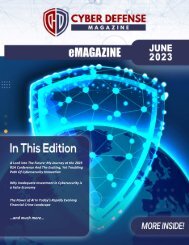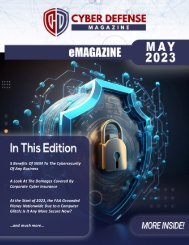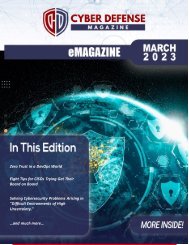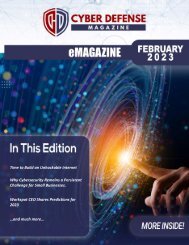The Cyber Defense eMagazine November Edition for 2023
Cyber Defense eMagazine November Edition for 2023 #CDM #CYBERDEFENSEMAG @CyberDefenseMag by @Miliefsky a world-renowned cyber security expert and the Publisher of Cyber Defense Magazine as part of the Cyber Defense Media Group as well as Yan Ross, Editor-in-Chief and many more writers, partners and supporters who make this an awesome publication! 196 page November Edition fully packed with some of our best content. Thank you all and to our readers! OSINT ROCKS! #CDM #CDMG #OSINT #CYBERSECURITY #INFOSEC #BEST #PRACTICES #TIPS #TECHNIQUES
Cyber Defense eMagazine November Edition for 2023 #CDM #CYBERDEFENSEMAG @CyberDefenseMag by @Miliefsky a world-renowned cyber security expert and the Publisher of Cyber Defense Magazine as part of the Cyber Defense Media Group as well as Yan Ross, Editor-in-Chief and many more writers, partners and supporters who make this an awesome publication! 196 page November Edition fully packed with some of our best content. Thank you all and to our readers! OSINT ROCKS! #CDM #CDMG #OSINT #CYBERSECURITY #INFOSEC #BEST #PRACTICES #TIPS #TECHNIQUES
You also want an ePaper? Increase the reach of your titles
YUMPU automatically turns print PDFs into web optimized ePapers that Google loves.
That being said, the Russian regime is under such pressure that it is likely to overlook such intrusions in<br />
pursuit of much higher and indeed existential priorities <strong>for</strong> itself. Russia may even use North Korean APTs<br />
as proxies in the future, since DPRK is already sanctioned almost to the maximum and in case of eventual<br />
diplomatic fallout has thus very little to lose. Thus, the digital flank of the Russia–Ukraine conflict which<br />
Russia tries to promote as a new-world-order-type-of-conflict between the West and loose anti-western<br />
coalition spearheaded by Russia and China and the ongoing tensions on the Korean peninsula are in<br />
risk of being greatly enhanced by closer collaboration between Russian and North Korea, that would<br />
bring a country with precious very little to lose to engage the West in the fifth domain.<br />
Conclusion<br />
Both North Korea and Russia are highly cyber-capable nations with a very high degree of willingness to<br />
use cyber as a tool of statecraft. Hackers of both countries can disrupt or break key infrastructure and<br />
steal sensitive in<strong>for</strong>mation. Russia’s ef<strong>for</strong>ts in online fraud, disin<strong>for</strong>mation and disruption to core<br />
infrastructure has become a significant threat to Western societies. North Korean cyber operations are<br />
also increasingly sophisticated. North Korean state hackers both collect intelligence and generate<br />
revenue <strong>for</strong> the state. <strong>The</strong> cyber espionage ef<strong>for</strong>ts are focused on the state’s perceived adversaries:<br />
mainly South Korea, the United States, and Japan; collecting intelligence on other countries’ military<br />
capabilities and stealing technologies that could be used by North Korean military – these ef<strong>for</strong>ts also<br />
include Russia and China as potential technology sources; and increasingly on stealing funds in the <strong>for</strong>m<br />
of cryptocurrency that the state later uses to fund its UN sanctioned missile and nuclear programmes.<br />
<strong>The</strong> distinct North Korean threat actors have repeatedly shown overlaps in targeting in the recent past<br />
and their ef<strong>for</strong>ts have been increasingly sophisticated.<br />
An agreement to supply artillery shells is the most significant result of the Russia–North Korea<br />
cooperation but it is not the only one aspect of this deal, which paves the way <strong>for</strong> more dangerous<br />
technology and know-how transfers and it connects war in Europe more directly with tensions in Asia.<br />
Both Russia and DPRK have been showing contempt <strong>for</strong> international rules in recent years and have<br />
actively and unscrupulously used cyber to promote their agenda. North Korea is to remain focused on<br />
targets related to its political, economic, and defense interests in the region but the announced<br />
heightened security cooperation between the two regimes should be treated as portending increased risk<br />
in cyberspace, especially <strong>for</strong> USA, South Korea, Japan and European NATO countries.<br />
<strong>Cyber</strong> <strong>Defense</strong> <strong>eMagazine</strong> – <strong>November</strong> <strong>2023</strong> <strong>Edition</strong> 149<br />
Copyright © <strong>2023</strong>, <strong>Cyber</strong> <strong>Defense</strong> Magazine. All rights reserved worldwide.


